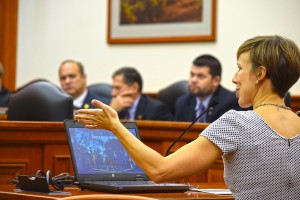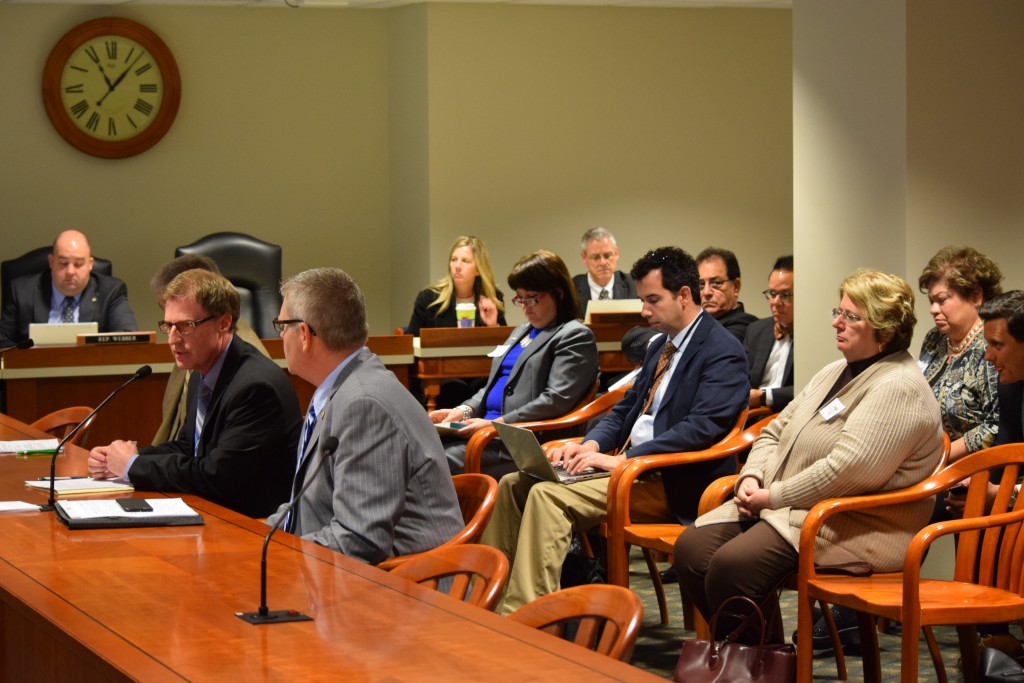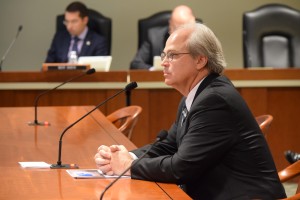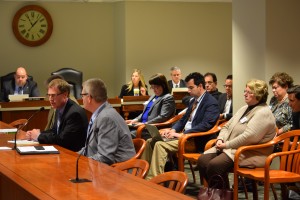
A school bus travels over bumpy roads.
Late last night the Michigan Legislature narrowly cobbled together the necessary votes to send a road funding package to the Governor Snyder’s desk for signature.
Over the past two-plus years the Michigan Municipal League has consistently called for a long-term sustainable solution that relies heavily on a significant amount of dedicated funding for transportation and doesn’t leave future state and local budgets hanging in the balance. This plan falls far short of that and there simply isn’t enough real revenue for roads in this package.
It’s an over-statement to say that a $1.2 billion plan with $600 million in new revenue and $600 in General Fund dollars will fix Michigan’s crumbling infrastructure. This is especially true given that two-thirds of the new revenue will simply replace General Fund money already budgeted for roads in the current fiscal year and the plan doesn’t fully phase in for almost a decade.
The framework of the plan includes 7.3 cents gas tax increase and a 20 percent increase in registration fees. Those increases don’t go into affect until January 1, 2017, meaning no new money will be infused into the system for 14 more months. Gas and diesel taxes will be indexed to inflation but not until 2022.
Additionally, the $600 million in General Fund revenue will be phased-in over three years beginning in FY 19 and relies on future Legislatures – some of whom aren’t even elected yet – to appropriate those General Fund dollars to uphold the promises of this current Legislature. History has proven that similar earmarks of this nature have gone unfulfilled.
Plan Details:
• HB 4736 increases passenger and commercial vehicle registrations fess by 20 percent per vehicle beginning January 1, 2017. The bill provides for additional increases for plug-in hybrid and electric vehicle registrations. These changes result in a $200 million revenue increase for transportation.
• HB 4738, HB 4614, and HB 4616, provide for gas and diesel tax increases to 26.3 cents, an increase of 7.3 cents per gallon beginning on January 1, 2017. The bills also implement diesel parity, institute a process for taxing alternative fuels, and tie the fuel tax rate to inflation beginning in 2022. These changes result in a $400 million revenue increase for transportation.
• HB 4370 dedicates $600 million of income tax revenue to transportation phased in over three years, $150 million in FY 19, $325 million in FY 20 and $600 million in FY 21. will This bill also provides $200 million in tax relief by expanding the Homestead Property Tax Credit. According to both the House and Senate Fiscal Agencies that when fully phased-in this will reduce the state General Fund by more that $800 million, or roughly 7 percent.
• HB 4737 requires MDOT and local road agencies to secure warranties, where possible, for construction and preservation projects over two million dollars and mandates new reporting requirements for MDOT and local road agencies on those warranties.
HB 4737 also creates a “Roads Innovation Task Force” that will form no later than December 1, 2015 and prepare a report no later than March 1, 2016. The Roads Innovation Task Force will evaluate road materials and construction materials that will allow MDOT to build roads that could last at least 50 years, will focus on materials and processes that may cost more upfront but produce life-cycle construction and maintenance savings, and concentrates on longer-term time frames that seek to maximize value of the taxpayers of this state
Additionally, HB 4737 creates a Roads Innovation Fund. This fund will collect the first $100 million each fiscal year starting in 2016-17 from fuel taxes and every year thereafter. The funds can only be released once the House and Senate approve a one-time concurrent resolution approving the report done by the Roads Innovation Task Force. Those funds shall be appropriated only for the use of specific higher quality, longer life cycle road construction purposes. Once the concurrent resolution is approved the fund shall no longer annually receive the allocation.
• SB 414 creates an automatic rollback of the income tax. The rollback occurs when General Fund growth exceeds the rate of inflation plus 1.425%. The first rollback could not begin until January 1, 2023.
• HB 4610 allows townships contributing 50% or more to a road project to require an RFP for pavement projects over $50,000 and gravel projects over $25,000.
• HB 4611 requires an RFP process for all projects over $100,000 for MDOT. Local road agencies must do RFPs for all projects, excluding routine maintenance, over $100,000, unless the local road agency affirmatively finds that they can do it themselves for less.
The League believes this plan is overly reliant on existing tax dollars and very likely establishes a foundation for potential cuts to local police and fire protection, higher education, economic development and our ability to attract and retain a talented workforce. It fails to address the key principles for which we consistently advocated – a long-term sustainable solution that invests in our road network, protection of essential services, and fiscal responsibility in regards to future state and local government budgets.
View a League media statement on the roads plan passed by the Legislature.
John LaMacchia is a Legislative Associate for the League handling transportation, infrastructure, and energy issues. He can be reached at jlamacchia@mml.org or 517-908-0303.







